At 59, when many consider slowing down and accepting a laid-back lifestyle, Kokila K took a leap of faith that would redefine her journey and leave a lasting impact. Hailing from Walajapet, Tamil Nadu, she founded Woodbee Toys in 2020, a company dedicated to creating non-toxic, sustainable wooden toys for children.
The conversation with Kokila taught me one of the best lessons— to do what you do with purpose, goodwill and determination. Despite the challenges she’s faced, she speaks about her journey with such ease, as if it’s just another part of life. What stands out most is how she focuses on what lies ahead, letting go of past hardships—a mindset many of us aspire to but often find difficult to practice.
Right from the beginning, it was easy to feel her passion for her work and the deep support of her family. Kokila’s belief that it’s never too late to start something meaningful will make you realise that age is just a number, and persistence is a power that doesn’t fade with time.
Losing her husband at 42
Born into a large family with five siblings, Kokila completed her Bachelor of Science in Mathematics and secured a stable government position as a Junior Telecom Officer in the Department of Telecommunications.
Her life took an unexpected turn at the age of 35 when her husband was diagnosed with a lung tumour caused by prolonged exposure to pesticides. “He was a pesticide distributor and also provided fumigation services, specifically for termite control in buildings,” says Kokila.
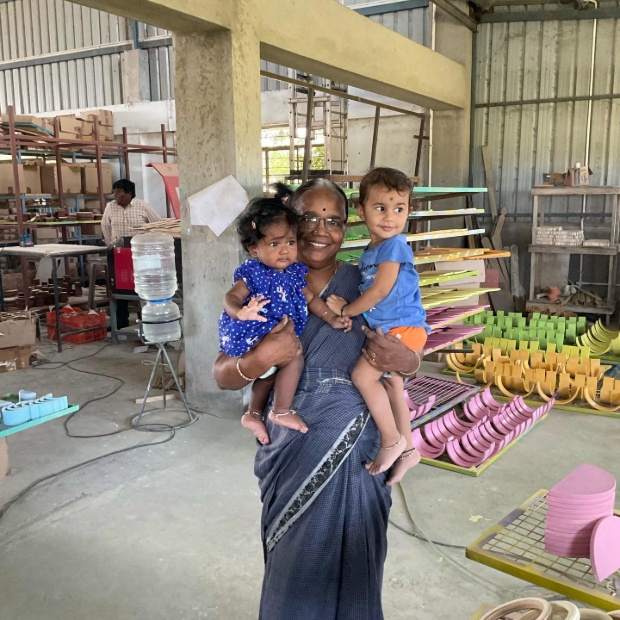
Fumigation is a method of pest control or the removal of harmful microorganisms by filling an area with gaseous pesticides, or fumigants, to suffocate or poison the pests within. It is used to control pests in buildings (structural fumigation), soil, grain, and produce.
As part of the export process for these companies, wooden containers used for packaging needed to be fumigated to prevent the spread of pests. “Since SIPCOT was nearby, he conducted these fumigation services at that location,” she adds.
Despite seven years of treatment, she lost her husband at 42, leaving her to support three sons, with the eldest just entering college.
Earning a meagre Rs 200 a month
The financial strain of medical expenses left Kokila nearly penniless, with her salary barely covering the family’s needs. “In the month when my husband passed away, the salary that I had in hand was just Rs 200, post loans and tax deductions,” Kokila recalls.
Determined to provide for her children, she stepped into her late husband’s business of pesticide fumigation and wooden box supply. “My eldest son was my right hand and very supportive at that point. He gave me motivation to take up his father’s business,” Kokila says.
“We did that only for a year and a half and decided to not get associated with pesticides as that turned fatal for my husband’s death,” Kolika explains. She shifted focus solely to manufacturing wooden boxes, marking her entry into the woodworking industry.
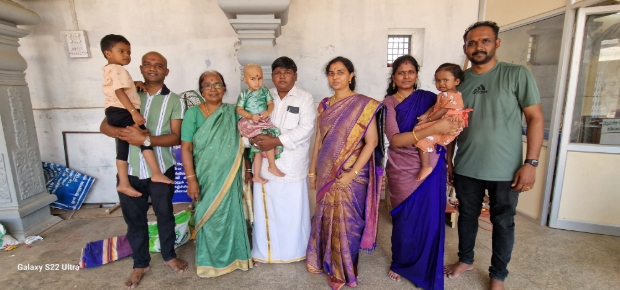
Managing a full-time job and taking up a manufacturing business is harder than it sounds, and it was no different for Kokila.
“My daily routine involved waking up at 7 AM and heading to the factory. I’d stay there until 9 AM before going to my office. Since my office was nearby, I would visit the factory during lunch break. After returning to the office, I would go back to the factory around 5 PM, finish my work there, and then return home,” Kokila says.
Kokila shares that during this time, her sons were studying in different districts of Tamil Nadu, which meant she was living alone. This gave her the space and flexibility to manage her multiple commitments more easily, without the added responsibility of household duties.
Shifting towards wooden toys
Years later, her eldest son made the bold decision to leave his promising job at Infosys and join the family business full-time, bringing fresh energy to their venture. However, by 2020, the pandemic severely impacted the export market, forcing the family to rethink their strategy and seek out new opportunities. “I had grandchildren of my own as well,” she adds.
This shift in focus allowed her to dedicate her attention to creating sustainable toys, an area she felt deeply passionate about.
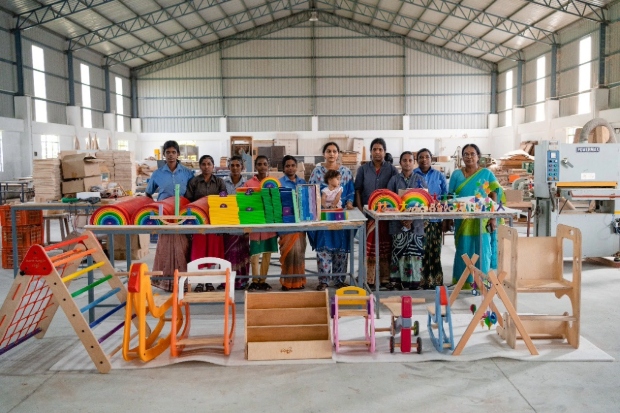
The idea for wooden toys came to Kokila during a simple visit to the market, where she was struck by the overwhelming presence of low-quality plastic toys. Concerned about the impact on children’s health, she and her family decided to take action. With their experience in woodworking, they began crafting toys, starting with neem wood teethers—a safe and natural alternative to plastic.
“The decision was rooted in safety. Unlike plastic, neem wood has natural health benefits and is completely safe for children,” Kokila explains. What started as a small step soon grew into something much bigger, with their toys quickly gaining popularity. Their sales strategy, primarily through Instagram, caught on fast, drawing in an overwhelming response from parents who appreciated the quality and thoughtfulness behind each toy.
Her daughters-in-law were a real support
Kokila’s venture was a true family affair. Her daughters-in-law played integral roles in the business, with one managing social media and the other overseeing product quality. Her sons are also actively involved in the process. “My third daughter-in-law is actually a doctor, but she is more invested in our business,” Kokila adds.
The collective effort ensured a steady stream of innovative and safe products. By designing toys inspired by her grandchildren’s interests, Kokila found a unique niche.
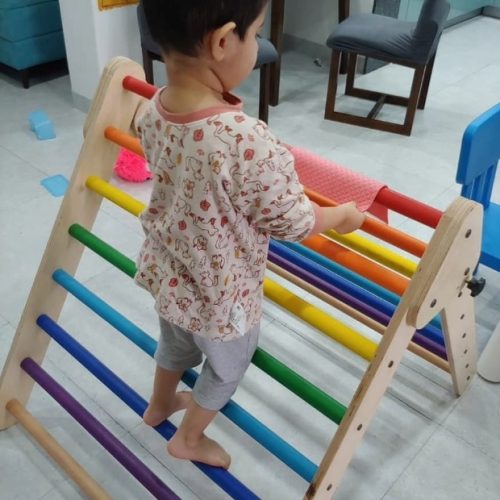
“When my granddaughter tried balancing on a bar, it inspired us to create the ‘balance beam’ toy,” she shares. Another product, an indoor gym dome resembling a half-football, was conceptualised with the help of her son’s maths professor to perfect its design.
“We’ve been inspired by a recent app game my granddaughter loves to play. It involves sorting coloured water in tubes, and it has presented a fun design challenge for us to create a similar physical toy,” adds Kokila.
Toys that are safe and inspired by the Waldorf method
What sets Woodbee Toys apart is its adherence to sustainability and safety. The company uses untreated neem, pine, and beech woods, avoiding chemically treated rubber wood. Even the paints are hand-picked—non-toxic and certified for toy use. Kokila emphasises, “We don’t compromise on safety. Each toy undergoes rigorous testing and is certified before reaching the market.”
“Sukanya had introduced me to non-toxic paints when I had mentioned that I did not want paint on my child’s toy,” shares Yunita Almeida, a homemaker and an ardent customer. “It was surprising to see the paint retaining its colour till date despite the heavy stains,” she adds.
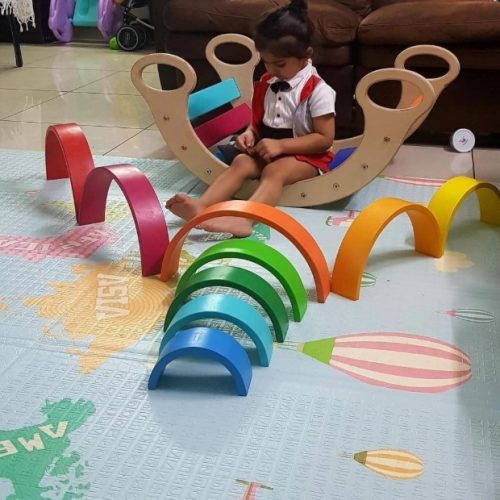
“I have been purchasing from woodbee toys for the past three years and there is a significant quality difference when you compare it with other wooden toys. The paint has not chipped, and there have been no cracks in the wood. It is in good condition that my second child is playing with the toys purchased for my first daughter,” shares Yunita
The toys are designed for open-ended play, inspired by Waldorf education principles. These toys encourage children to use their imagination rather than following predefined rules, offering limitless possibilities for creativity.
A women-led workforce earning Rs 20-30 lakh/month
Woodbee Toys operates with a workforce of 40–50 people, the majority being women from nearby villages. Many of these women had minimal education, yet under Kokila’s guidance, they learned to operate machinery and became confident contributors to the factory.
“The women initially hesitated but soon took pride in their work. Now, they are the first to try new machines,” Kokila says. The supportive environment fostered a sense of empowerment among the employees, making Woodbee Toys a beacon of opportunity for local women.
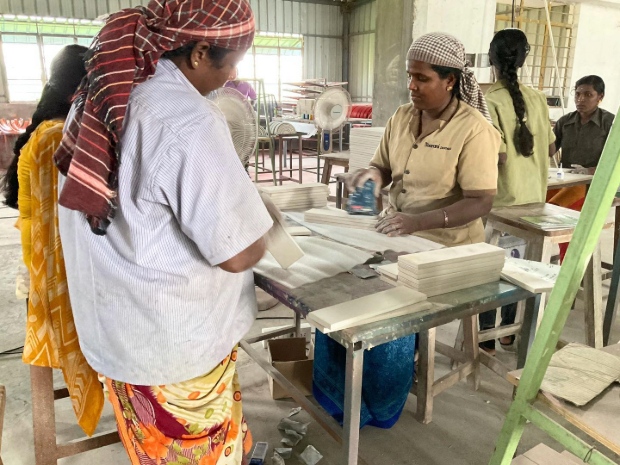
Starting with monthly earnings of Rs 20,000 to 50,000, the company now generates a revenue of Rs 20–30 lakh per month, manufacturing 10,000–20,000 toys. Their product range includes over 110 toys, with bestsellers like kitchen helpers, indoor gyms, teethers, and balance beams. Woodbee Toys supplies to major brands like FirstCry, Hamleys, and Funskool while maintaining direct sales through Instagram and their website.
Kokila attributes the success to customer feedback and adaptability. “When customers suggested improvements for our gym toys, we immediately incorporated their input into the next design. Customer satisfaction drives us,” she says.
“Some customers are very sweet and they send us review videos for every new product brought. The videos are raw and that makes it special,” says Suganya K, the third daughter-in-law who handles the social media and the website.
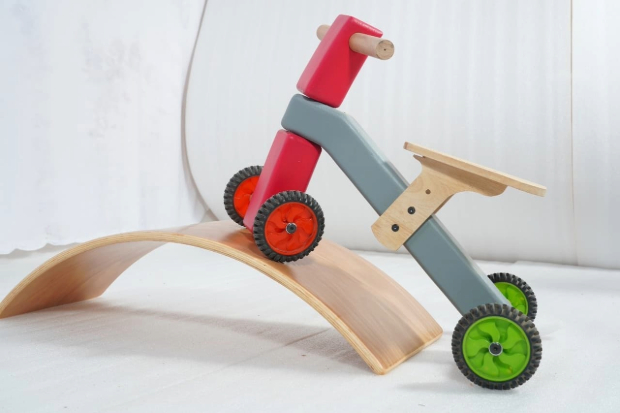
“I own around 10 of their toys,” Yunita shares her satisfaction. “The packaging and the delivery are also done with premium quality,” she adds, who is planning to buy their newly launched product as well.
Woodbee Toys is on the cusp of entering the global market, with trial exports to Australia and the United States of America underway. Plans are also in place to expand to Saudi Arabia and Sri Lanka in 2025. The company intends to establish a dedicated design team to scale innovation further while retaining its customer-focused approach.
“Since our toys are made out of wood, there are a few weight constraints in shipping abroad. We are working on that as well,” shares Suganya.
More than a business
For Kokila, age and challenges have never been barriers but opportunities to grow. “Education and knowledge are different. Interest matters the most. I feel enthusiastic about being involved in this; otherwise, I’d feel very old,” she laughs.
Kokila’s story is more than a business success—it is an inspiring narrative of how adversity can be a springboard for reinvention. Her ability to turn personal tragedy into a thriving enterprise not only transformed her life but also empowered her family and community.
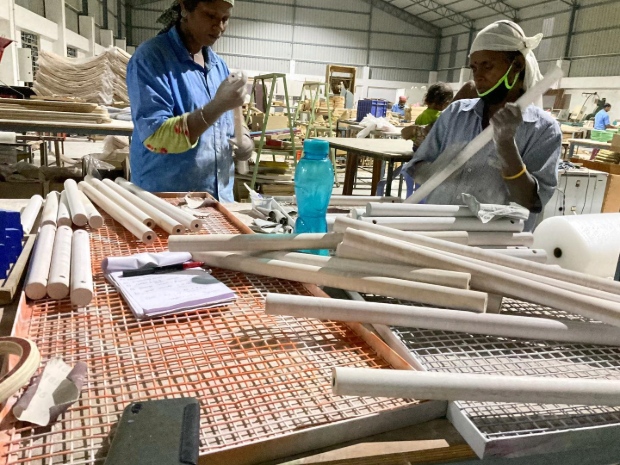
I could picture Kokila crafting the toys every kid deserves in her manufacturing unit. There was a quiet strength in her as if each piece she created held her skill and heart. By creating toys and empowering women, her journey reminds us that every small step counts and that the courage to start anew is always worth celebrating.
Woodbee Toys is not just a company; it is a legacy of love, strength, and innovation, proving that it’s never too late to dream big.
Edited by Leila Badyari Castelino, All images coutesy Woodbee Toys
No comments:
Post a Comment